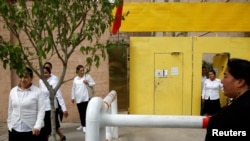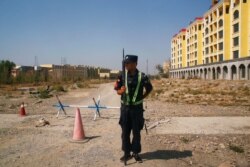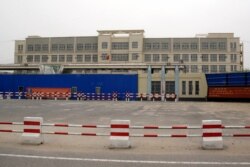As new reports emerge of China using Uighurs as “forced labor," Beijing could be moving to a new phase of crackdown against the minority group in Xinjiang, experts warn.
The Australian Strategic Policy Institute (ASPI), a nonpartisan think tank, earlier this week released a report titled Uyghurs for Sale, which claimed that as many as 80,000 Uighurs have been “forcefully” sent from their homeland region of Xinjiang to work in factories in other parts of China.
The Canberra think tank said the Uighurs were transferred directly from so-called reeducation camps to factories across China working “under conditions that strongly suggest forced labor,” according to the report.
“In factories far away from home, they typically live in segregated dormitories, undergo organized Mandarin and ideological training outside working hours, are subject to constant surveillance, and are forbidden from participating in religious observances,” the ASPI report said. It added that transferred Uighurs have limited freedom of movement and are assigned guards in the factories.
Darren Byler, a Seattle anthropologist and China expert at the University of Washington, said that more reports about the coerced labor of Uighurs show China could be moving to the next phase of its policy in Xinjiang after officials said most people in the detention camps had “graduated.”
“This shows us that the Chinese authorities have inserted large-scale human rights abuses into their garment manufacturing supply chain. This has thrown into question around a third of the world’s cotton supply and a significant proportion of global garment manufacturing,” Byler said. He added that the move could have a far-reaching impact on the demographics of Xinjiang by compelling many Uighurs and their families to move out of the region to work at factories in other provinces.
“Until we have verified proof that Chinese manufacturers are not using coerced labor, people of conscience should avoid buying garments and shoes that are made in China. Dozens of global brands are implicated in this. The next steps will be organized consumer boycotts and legal actions to ensure that these brands follow through on their ethical commitments not to use forced labor. The key to change will be sustained attention on this issue,” Byler said.
Chinese officials have called the ASPI report “simply baseless,” adding that accusations about the coerced labor of Uighurs is a campaign to distort the country’s image.
'Fabricated'
Rejecting the report during a news conference this week, Chinese Foreign Ministry spokesperson Zhao Lijian said that it was “just another fabricated and biased accusation on Xinjiang by this institution to show its allegiance to the anti-China forces in the U.S. and smear China's counterterrorism and deradicalization measures in Xinjiang.”
Uighurs are Turkic speaking and a majority Muslim group native to Xinjiang, a northwest region in China. With a population of 11.5 million, they make up about 50% of the total population in that region.
Chinese authorities have been accused of arbitrarily detaining since 2017 more than 1 million Uighurs at internment camps, while imposing strict surveillance on those outside. Rights organizations say those in detention are put into indoctrination programs and forced to denounce their Islamic practices.
“Much of the evidence we have seen leaked out of the region, including the way the state is breaking Uighur society down to the family unit and intruding in every aspect of daily life, points to cultural genocide and a form of ethnic cleansing,” Elise Anderson, a senior program officer at the Uyghur Human Rights Project in Washington, told VOA.
Chinese officials, however, have denied those accusations, saying their policies in the region are aimed at countering “the three evils of terrorism, extremism and separatism.” They have announced the camps are merely “vocational training centers” set up to “reeducate” the Uighur community members and teach them “new skills.”
Adrian Zenz, a senior fellow in China studies at the Victims of Communism Memorial Foundation, said the increased reports on Xinjiang show Chinese Communist Party (CCP) policies in the region are long term, based on eliminating any possible threat of its dominance.
“The main purpose of what the CCP is doing in Xinjiang and elsewhere is to ensure its long-term rule through controlling society. The CCP's control was threatened by Uighur reactions to perceived discrimination and grievances. Uighurs have a distinct identity and do not associate as much with Beijing as with, say, Istanbul, or places in Central Asia. The current strategy of the CCP is to attack any aspect of this distinct identity,” Zenz said.
Stepped-up suppression
Conflict in Xinjiang region is not new.
Since 1949, Chinese authorities have tried iron-fisted methods to suppress dissent and assimilate local ethnics, said Tim Grose, an assistant professor of China studies at Rose-Hulman Institute of Technology in Terre Haute, Indiana.
Grose said that since 2017, the region has witnessed “a radical and unprecedented violent acceleration of this project,” as the world began focusing on fighting the Islamic State group and its networks from around the world.
“CCP is tapping into global anxieties about Islam, and reaching out to a sympathetic audience, when they frame their policies as ‘anti-extremist,’ and ‘counterterrorism,’ ” he told VOA.
The United Nations has repeatedly asked China to allow its observers enter Xinjiang to investigate the alleged rights abuses. Chinese officials have said they would welcome U.N. officials, but only on the condition they not meddle in the country’s internal affairs.
U.N. rights chief Michelle Bachelet last week announced that she was preparing for a visit to China to analyze “in depth” the human rights situation in the country, including in Xinjiang. Bachelet welcomed the invitation from Beijing to visit the region and will continue to request “unfettered access” to investigate the situation of the Uighur minority, she said.






